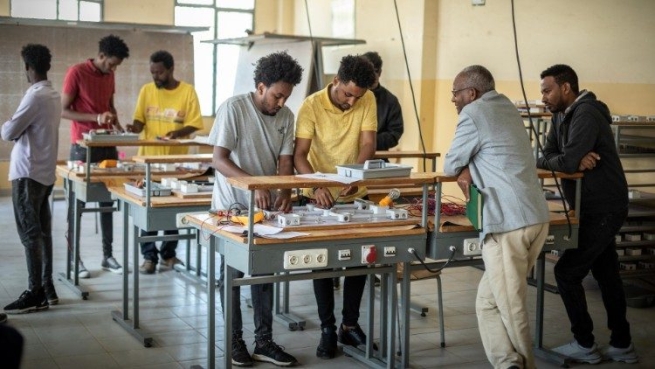Abebech, an Ethiopian mother who arrived in Addis Ababa from Zwai in search of work, was taken in with her baby, by the Missionaries of Charity. She then studied cutting and sewing at the Mary Help College of the Salesian Daughters of Mary Help of Christians, and now works in a clothing company.
Herut, an Eritrean migrant, left the Mai-Aini Refugee Camp in Ethiopia’s Tigray region. After knocking on the door of the Jesuit Refugee Service refugee centre in the Ethiopian capital, Herut now studies hairdressing at the JRS training centre.
Samuel, who grew up on the streets, in the Addis Ababa suburb of Mexico, accepted Father Angelo’s invitation to go to the Don Bosco Children Centre, and thanks to the Salesians' training, he now works at a leather-bag factory, and lives with friends in a home they rent. He can do this due to the 4,000 birr he earns a month, which is about 67 euro, but amounts to a decent salary in Ethiopia.
These are some of the 1,500 internally displaced persons, 'returning' migrants, and refugees, from other African countries, whose lives have changed thanks to a pilot project launched in late 2020 in Addis Ababa by the Global Solidarity Fund (GSF).
This GSF initiative has been made possible also through the cooperation with women's and men's religious congregations, that, with GSF, have the aim of working together with private companies and international organisations to strengthen their commitment to improving the lives of vulnerable people.
The Global Solidarity Fund supported the establishment of a consortium that now involves the following five religious congregations, coordinated by the Archdiocesan Socio-pastoral Commission: Salesians and Salesian Sisters (Daughters of Mary Help of Christians), Ursuline Sisters, Missionaries of Charity, and Jesuits (through the Jesuit Refugee Service).
Each congregation, with its own specificities, has its own role in creating a pathway that has enabled many beneficiaries to acquire skills, through vocational training, that have enabled them to enter into the local labour market, either through employment in a company, or by starting their own small business.
Abebech Tesfaje tells us that her former boyfriend, when she became pregnant, told her: “This is not my baby, you can kill it.” But, as she explained, thought: “It is a gift from God. I cannot kill him.”
“So, when I heard that Mother Teresa's nuns could help me,” she recalled, “I went to ask for help, and they took me in.”
The Missionaries of Charity, in the inter-congregational network, provide healthcare, especially for the many women displaced from rural Ethiopia or by the recently-ended war in the nation’s Tigray region, but also for those expelled from the Gulf Arab countries where they had emigrated, after traumatic experiences.
Many arrive in Addis Ababa with unwanted pregnancies or after being abandoned by their mates.
The sisters assist them in childbirth free of charge, and often convince the young women who initially did not wish to keep their children, or give birth, to reconsider.
Mothers and their babies are taken in for a few months in facilities, such as the Nigat Centre, and from there, directed, with the help of social workers, for training courses by the Salesian Sisters, in fashion design, domestic help or IT; by the Salesians, in leatherwork, carpentry, graphic design, welding, electrical work and printing; by the Ursuline Sisters, in clothing production; or by the Jesuit Refugee Service, in IT, catering, hairdressing and manicuring.
Some of these congregations, such as the Salesians and Jesuits, are involved in the graduates’ job placement, with JRS, having extensive experience in supporting the start-up of small enterprises.
Vulnerable women have studied or are still studying cutting and sewing, domestic help and IT at the Mary Help of Christians College. The FMA sisters also take in the young children of pupils and former pupils in their kindergarten. The women trained by them are in great demand by the many clothing companies in Addis Ababa, as confirmed by Lydija Worku, owner of Emmanuel Garment. "Those who are trained at Mary Help College, have many excellent skills," she explained, "which is why we joined with the Salesian Sisters in this project. “We have already hired nine employees trained through the project, but we would need at least forty."
The Don Bosco Children Centre hosts Samuel Dejene, a nineteen-year-old who lived on the street, “in a place called Mexico, here in Addis Ababa,” before Father Angelo Regazzo, the centre's treasurer, “who goes every day to the street children, met me and said: ‘Come with me and see what we are doing. He brought me here and I followed the 'Come and See' programme for a month.’”
After that first contact, Samuel decided to take the leather-cutting course, and has been working in a company for slightly more than a month, thanks to the help of the Salesian employment officer.
In the St Michael's Centre, which houses the offices of the Socio-Pastoral Commission of the Archdiocese of Addis Ababa, the heads of the various congregations involved in the project are meeting to consider how to move from an experimental phase to a more stable one. An agreement has also been signed with a bank and another financial institution to provide micro-credits to migrants who want to start their own businesses.
The unitary training hub, the priest noted, has been created: “the job placement hub, and then, the job-creation, and self-employment hub, and also the health hub.” This is an important project because it saves the life of so many young people and women. In the next phase, which is expected to last three years, with the help of the GSF it is hoped to train 10,000 people.


